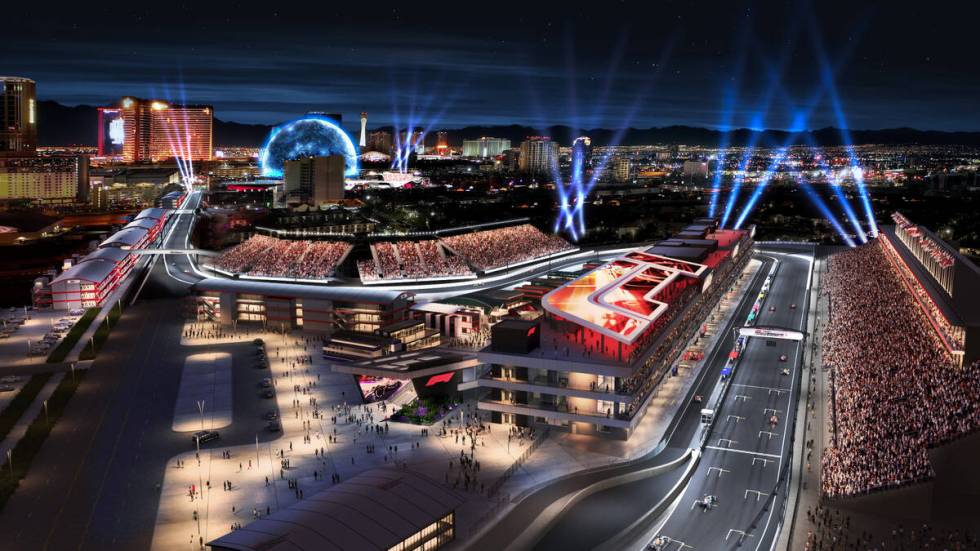Temporary bridges vital to Las Vegas Grand Prix transportation

Some of the temporary structures set to be built to ensure essential traffic can travel in and out of the Las Vegas Grand Prix footprint will be a feat upon itself.
Three temporary bridges will be constructed at various locations over the race’s circuit, with pedestrian and vehicle movement in mind. The Las Vegas Grand Prix will take place Nov. 16-18 on a 3.8-mile track spanning portions of Las Vegas Boulevard, Koval Lane and Harmon and Sands avenues.
The main attraction of the infrastructure operations will a temporary bridge to be constructed on Flamingo Road over Koval Lane. On a average day, about 55,000 vehicles pass through the intersection daily, according to Nevada Department of Transportation data.
The four-lane bridge will be built to freeway standards and will be able to facilitate vehicles as large as semitrucks, according to Steve Hill, president and CEO of the Las Vegas Convention and Visitors Authority.
“It will allow drivers to drive over Koval without stopping at the light there,” Hill said. “Which is actually kind of an interesting thing to look at from a potentially permanent standpoint. That circuit will then run underneath that bridge. It’s a thing, with my construction background, I get excited about just that.”
Three bridges planned
Terry Miller of Miller Project Management, who is overseeing the infrastructure work, said the Flamingo bridge will be the largest of the trio of bridges that will be added to the track. The bridge will run east-west, be 750 feet long and feature two lanes in each direction, Miller noted.
“We’ll put that down the middle of Flamingo Road over Koval,” Miller said. “We will also maintain surface lanes on the north side and south side of that bridge. The idea is when the track is hot, when there’s racing, that’ll be the bridge that allows emergency vehicles and other vehicles to cross over the track so that they can service the 23,000 rooms we have inside the track.”
Officials will manage the movement of the traffic on the bridge during the race, and when there is not racing happening, the bridge will be open to all motorists, and they will be able to bypass the traffic signal at the intersection, Miller said.
“If you don’t want to hit the stop lights you can go up on the bridge, either eastbound or westbound, as a public thoroughfare,” Miller said.
A bridge near Top Golf will be constructed that will be open exclusively to race-related traffic.
“That allows us to accommodate the customers at the Paddock Club, through shuttle systems that will allow us to take them before the event and after the event, but primarily when the track is hot,” Miller said. “That allows us to do what we needed to do while still having racing on the track.”
The bridge will span the west side of Top Golf on Koval to the front of the paddock building, where the highest-end spectator packages are located on the northeast corner of Koval and Harmon Avenue.
The third bridge will be on Audrie Lane — which runs north-south between MGM Grand and Planet Hollywood — over Harmon and is slated to be a semipublic bridge that will feature two lanes, one in each direction, Miller said.
“When there is racing that is the only way emergency vehicles and service vehicles can get to that corner of the interior circuit area,” Miller said. “We worked with the Clark County Fire Department and Metro Police Department to make sure that becomes a safety route for them.”
When there is no racing taking place during the weekend of the event, the bridge will be a public road.
The bridges will start being put into place at the three locations in mid-October.
“This is our first year, so we had to make sure we can get them up in time to see if there is anything that we need to change ahead of this year’s race,” Miller said. “I think you’ll see that we will be able to do it later in the year in years to come.”
Assembly in segments
The bridges will be built off site and be transported to the area in segments where they’ll be assembled at the three locations.
“There will be five segments at the two bridges at Top Golf and Audrie,” Miller said. “You’ll have approaches, you’ll have the ramps and then you’ll have the main spans. Those five pieces will be craned into place.”
The Flamingo bridge will be eight pieces for each side and will take about three weeks to construct.
Removing the bridges following the race will take a couple of weeks to carry out, Miller said.
As Miller noted, those temporary bridges will be important to the Clark County Fire Department’s operations during the race.
“We’ve looked at different ways that we’re going to access everywhere, both inside and outside (of the track),” fire Captain John Steinbeck said. “F1 has been working really well with us. We’re planning it all together. We’re confident that we’ll be able to get our vehicles in as needed.”
Clark County firefighters and other EMTs will be stationed around the track to ensure they are able to respond to any incident, no matter where one may occur in the race’s area.
“We will have emergency units and resources staged during the race in places that we’ll have slower access to,” Steinbeck said. “It’s going to be a really busy weekend for us; a lot of work in between now and then, figuring it out. But we’ll have a lot of resources available and in the right places.”
Deputy Fire Chief Warren Whitney said the department will have more than 100 staff members working the race.
“We’ll definitely have a robust amount of staff and resources inside,” Whitney said.
Contact Mick Akers at makers@reviewjournal.com or 702-387-2920. Follow @mickakers on Twitter. Send questions and comments to roadwarrior@reviewjournal.com.